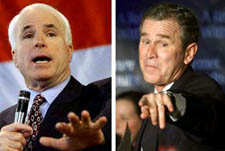
|

|
Jewish World Review March 2, 2000 / 24 Adar I, 5760
 |
THERE WAS A TIME when foreign policy was a
centerpiece in any American presidential
race. But with the Cold War a fading
memory — and this country suffering from one
of its spells of neoisolationism — today's crop of
presidential wanna-bes seems to have relegated
foreign affairs to the back burner.
Still, the candidates do have positions. In the Republican race, the
two leaders have views that sometimes overlap and sometimes
diverge. Unfortunately, neither has much to offer that's daring or
even innovative. John McCain is certainly aware of the rest of the world. Consider
this anecdote from a nurse who cared for him when he returned
from a North Vietnamese prison camp in 1973: While other
liberated servicemen were eager to catch up with family and fun,
McCain asked for newspapers and magazines to catch up with the
news he'd missed.
So why isn't he giving us better ideas? For example, he rashly
demands that we either unilaterally abrogate our commitment to
the Antiballistic Missile Treaty that we signed with the Soviet
Union or "expeditiously negotiate a revision of it."
George W. Bush, who learned about foreign policy at his father's
knee, is no better on this dangerous issue. He also is prepared to
cancel the ABM Treaty if we can't persuade Moscow to agree to
amendments that would allow quick deployment of an anti-missile
system.
The two diverge on how best to strengthen America's military and
make it more efficient. McCain would cut pork-barrel spending at
the Pentagon to provide more funds for military basics, including
better pay for people in uniform.
Bush believes the military needs an immediate infusion of cash
before it can efficiently assess which programs to keep and which
to drop.
HAVING IT BOTH WAYS ON CHINA
McCain doesn't want to limit trading or "freeze our diplomacy"
with Beijing, but he says America has to prepare for the possibility
that in this new century China will emerge "as the primary threat to
American interests and values." In other words, let's get tougher
with China, but not so tough that we lose contracts. Is that the best
he can do?
Mideast policy seems to be fairly equal. While they both indicate
complete support for Israel's right to decide what's best for its
security — and Bush would move the U.S. Embassy to Jerusalem
— each understands the need for America to actively escort
Arabs and Jews toward a peace.
Bush's staff, citing his attitude on Death Row cases, says he would
reconsider the case only if "compelling new evidence" surfaced.
McCain rules out clemency for Pollard. Not much heart there.
One major plus: Both candidates hail from the Southwest and
understand the importance of strengthening ties to Latin America.
But after surveying their major foreign policy positions, all I see are
generalities — no clear blueprints for the future. And on some
major international threats, neither candidate has anything of
substance to say — e.g., how to combat global terrorism or the
worldwide plague of AIDS, or how to deal with Iran. Men who
want to lead the world should do
By Richard Z. Chesnoff

 Neither man has anything effective or new to say on dealing with
the world's giants. Both are justifiably fed up with Russia's
post-Soviet corruption and economic mess. Bush opposes further
international loans and wants to make sure future U.S. assistance
goes "to the Russian people, not to the bank accounts of corrupt
officials," which sounds nice but may win this year's
stating-the-obvious award.
Neither man has anything effective or new to say on dealing with
the world's giants. Both are justifiably fed up with Russia's
post-Soviet corruption and economic mess. Bush opposes further
international loans and wants to make sure future U.S. assistance
goes "to the Russian people, not to the bank accounts of corrupt
officials," which sounds nice but may win this year's
stating-the-obvious award.
On China, Bush is far more critical of current policy. The Texas
governor wants to redefine the U.S. relationship with China as one
of competitors, "not of strategic partners."
 The two also have similar views on an ancillary issue: the fate of
Jonathan Pollard, the former Navy analyst who has been behind
bars for 15 years for giving Israel intelligence secrets, far longer
than any other man convicted of spying for a friendly nation.
The two also have similar views on an ancillary issue: the fate of
Jonathan Pollard, the former Navy analyst who has been behind
bars for 15 years for giving Israel intelligence secrets, far longer
than any other man convicted of spying for a friendly nation.
JWR contributor and veteran journalist
Richard Z. Chesnoff is a senior correspondent at US News
And World Report and a columnist at the NY Daily News. His latest book is Pack of Thieves: How Hitler & Europe
Plundered the Jews and Committed the Greatest Theft in History.
02/23/00: The Forest That Haunts Austrian Politics
01/26/00: Second look at Nazi loot
01/20/00: Foreign Policy: Do Candidates Even Have One?
01/03/00: Sudden Interest in WWII Justice Has Many Causes
05/20/99: Barak Can Deal From Strength
04/13/99: Is U.S. Right in Kosovo? Yes, We Can't Accept Genocide
02/10/99: King Hussein Was Truly Gentle Man of Peace . . .
01/19/99: Europe's Really Worried Now
12/30/98: Despite Critics, Nazi Loot Hunt Is Right & Proper
12/21/98: To Beat Saddam, Sustain the Raids
11/24/98: Iran's Meddling Is a New Danger for South Africa
11/05/98: Saddam's a ticking time bomb
10/29/98:
Pollard's Release
Is a Key to Peace Deal
10/15/98:
Hawkish Sharon May
Bring Home the Dove of
Peace
10/07/98:
Flake of Araby Won't
Make Deal on Pan Am 103
8/25/98: Embarassed to be a journalist
8/24/98: Clinton Sent Right Message With Those Missiles . . .
8/17/98:
Fair Settlement
For Survivors of
the Holocaust
7/27/98: When hopes collide with reality
7/22/98: A lesson about peace ...in Auschwitz
7/15/98: What Hitler tried todestroy, the 'Net helped put back together
7/8/98: Love -- and leave -- thy neighbor
4/9/98: The US Navy's two faced Pollard policy
4/2/98: A breakthrough in Lebanon?
3/30/98: Full rights for all Israelis?
2/27/98: America's Schindler
1/30/98: A last chance for the Mideast?
1/11/98: The Moment for Restitution Has Arrived